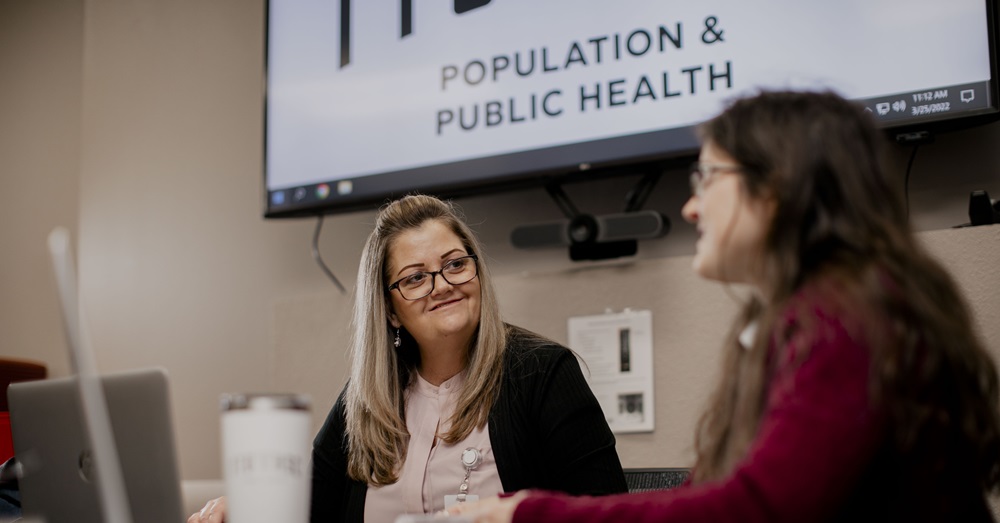Health Care With a Purpose
Get to know the School of Population and Public Health and what it means to be a part of it.

What is a School of Population and Public Health? There are aspects of life that we immediately associate with health care. Most of us picture a doctor’s visit about an injury that hasn’t healed properly, or finding the nearest urgent care when flu season hits.
Population and public health works beyond individual medical issues. With focuses such as preventing diseases and injuries among groups of people, this health care field is predominately committed to protecting and improving community health—covering a vast range of community sizes, from a neighborhood to the country as a whole. Think of an epidemiologist studying the spread and effects of a pandemic, or a hospital planning for the health needs of its community.
Earning a degree and building a career in population and public health is not a one-size-fits-all experience. These experts focus on many elements of health and safety, including disease prevention efforts, health care access and disaster relief. Since these roles take on many forms, The Julia Jones Matthews School of Population and Public Health must prepare students for a wide variety of paths and interests within the field, emboldening them for a future in health care unlike any other discipline.
Masters of Public Health (MPH)

Our MPH program can be completed in 15-24 months
The Julia Jones Matthews School of Population and Public Health offers comprehensive academic programs, including the fully-online Master of Public Health (MPH) program. These courses are designed to protect and promote human health for the individual and the larger population. Our 45-hour program can be completed in 15 to 24 months, and is fully online—providing students the flexibility to tailor coursework around busy schedules.
The generalist concentration prepares professionals to practice evidence-based preventive public health, conduct informative research and provide interdisciplinary expertise for academic and professional settings. A varied and flexible degree, you can take these skills and apply them to public practice. Check out our admissions page for application and requirements information.
Where the Path Might Lead

Degrees in population and public health are varied and flexible, leading to a wide range of careers
There is a long, ever-growing list of careers and pursuits that involve a degree from a school of population and public health. Below are just a few examples of some paths you can take with a degree in this field.
Epidemiologists
Epidemiologists are public health experts who explore causes of illness, disease and injury. These professionals use research and policy to reduce the risk of negative health outcomes and educate communities.
Biostatistician
A biostatistician helps in the field of health care by using statistics and data on a mathematical level to make decisions about medicine and public health.
Health Care Consultants
Health care consultants come in many forms. While assisting providers and health care institutions, they discern what is best for patients when looking into budgets, policies, etc. Also, large businesses have started to introduce health and safety personnel in their companies to ensure safety regulations and manage health services to their employees.
Next Steps
Are you interested in a future in health care and advocating for community health and safety? The school of population and public health is a space to follow those passions and focus on that change. Visit our admissions page to see upcoming program application deadlines, or learn specifics about what the MPH degree has to offer on our program page.
Related Stories
TTUHSC Receives $1 Million Gift from Amarillo National Bank to Expand and Enhance Pediatric Care in the Panhandle
TTUHSC School of Medicine leaders accepted a $1 million philanthropic gift from Amarillo National Bank on Tuesday (Feb. 10), marking a transformational investment in pediatric care for the Texas Panhandle.
Texas Tech University Health Sciences Center Permian Basin Announces Pediatric Residency Program Gift
TTUHSC Permian Basin, along with the Permian Strategic Partnership and the Scharbauer Foundation, Feb. 5 announced a gift that will fund a new pediatric residency.
The Ph.D. Programs that Shape Health Care
The Graduate School of Biomedical Sciences Ph.D. programs at TTUHSC provide the foundation, mentorship and research opportunities you need to pursue groundbreaking work.
Recent Stories
The John Wayne Cancer Foundation Surgical Oncology Fellowship Program at Texas Tech University Health Sciences Center Announced
TTUHSC is collaborating with the John Wayne Cancer Foundation and has established the Big Cure Endowment, which supports the university’s efforts to reduce cancer incidence and increase survivability of people in rural and underserved areas.
TTUHSC Receives $1 Million Gift from Amarillo National Bank to Expand and Enhance Pediatric Care in the Panhandle
TTUHSC School of Medicine leaders accepted a $1 million philanthropic gift from Amarillo National Bank on Tuesday (Feb. 10), marking a transformational investment in pediatric care for the Texas Panhandle.
Texas Tech University Health Sciences Center Permian Basin Announces Pediatric Residency Program Gift
TTUHSC Permian Basin, along with the Permian Strategic Partnership and the Scharbauer Foundation, Feb. 5 announced a gift that will fund a new pediatric residency.
